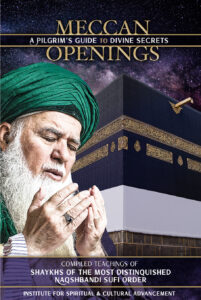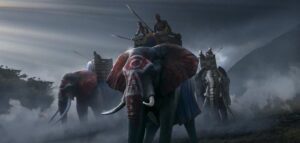Allah (swt) says in Sūratu ’l-Fīl:
أَلَمْ تَرَ كَيْفَ فَعَلَ رَبُّكَ بِأَصْحَـٰبِ ٱلْفِيلِ
Alam tara kayfa fa`la Rabbuka bi aš-ħābi ’l-fīl
Have you (O Muhammad) not seen how your Lord dealt with the owners of the elephant?
Here Allah (swt) is addressing Prophet (s) in this first verse of the Surah. What do we understand from this? The Prophet (s) was born 55 days after the incident of the elephant, but the tone of this text indicates that Allah is saying that the event passed directly before the Prophet’s (s) witnessing eyes. “Have you not seen?” This is a rhetorical question, the assumption behind it is that of course he did see it, and the purpose is to emphasize its significance. How could the Prophet (s) have seen it when he was born 55 days later? It means the Prophet (s) was given to see when he was in the womb of his mother! He was able to see what happened to Abraha when he came to destroy the Ka`bah.
Allah (swt) sends us a hint of the knowledge of the Prophet (s) by mentioning this event in relation to the Prophet’s (s) witnessing of it. He is showing Muslims, past and present, that He gave knowledge of that event to His Prophet (s), while no ordinary man could have had knowledge of the event from the womb of his mother.
Our belief, as Āhl as-Sunnah wa ‘l-Jama`ah is that Prophet Muhammad (s) could see also when he was only a seed in the back of his father `AbdAllāh. Even in the time of all his ancestors he could see—from the times of Sayyīdinā Ibrāhīm (as), Isma’il (as) and even further back—from the time that he was a light in the forehead of Adam (as) and even before Adam (as) was born he was able to see, because as he (s) said:
“I was a prophet when Adam was between soul and body.”
That is enough to establish for every one of today’s scholars that the Prophet (s) is not just a message deliverer who came, gave his message and left. If he was just here as a delivery person, then how was he able to see from the womb of his mother—the existence of his special sight means that not only the message but also the Messenger (s) was a keeper of Divine Light.
Importance of the Event
When they see something strange, people say, “Didn’t you see what happened?!” They say this to emphasize the greatness of the event. By saying alam tara, “Have you not seen,” Allah (swt) is indicating the immensity of this incident, that something magnificent happened by asking, “Have you not seen?” At the same time Allah is telling Prophet (s), “O Muhammad, did you see how immense this event was?” This is to show also that what happened was beyond the capacity of the mind. There is no way to describe it, it must be seen. That is Allah’s Action. It is not like the action of human beings. No one else can do what Allah is referring to when He says, “Have you not seen, (O Muhammad) how Allah dealt with the Owners of the Elephant?”
Scholars say that through this story Allah (swt) wants us to know the greatness of Sayyīdinā Muhammad (s)—that he was given power before he was born to see, by mushāhada, to witness, from the womb of his mother, what was happening to Abraha. In fact we as Āhlu ’s-Sunnah wa ’l-Jama`ah believe that Allah (swt) created this dunyā—which does not weigh as much as the wing of a mosquito in the Eyes of Allah—for the sake of the Prophet (s) and that in the Kalimat ash-Shahāda, the phrase Muħammadun Rasūl Allāh (s) represents the whole creation. Lā ilāha illa ’Llāh references the Creator and Muħammadun Rasūl Allāh references the creation. So it may be that Muhammad (s), from the womb of his mother, was directing the birds when they killed Abraha and his people, like a commander in chief or the general of an army.
In his tafsīr Rūhu ’l-Bayān, Shaykh Isma`īl Hakkī says, “This shows you the greatness of Allah’s Power and His perfect knowledge and wisdom, and the honor He gave to His house and the honor that He gave to His Prophet (s).” He described this event as belongs to irhāsāt which are miracles that occur before a prophet is honored by Allah with that miraculous power.
Another example of irhāsāt is that before Prophet (s) was ordered to deliver the message, he used to have a cloud, ghamāma, above him to shade him from the sun. Wherever he used to walks, a cloud would move above him – and that’s why they call one mosque Masjidi ’l-Ghamāma in Madinatu ’l-Munawwara. He was able to hear tasbīħu ’l-ħajar – the stones praising Allah (swt). Everywhere he walked in Meccatul-Mukarrama he (s) was able to hear the tasbīħ of the mountains, praising Allah (swt). So many extraordinary things (irhās) happened before the Prophet’s (s) bi`tha—before he was ordered to deliver the message.
 [Extracted from Meccan Openings: A Pilgrim’s Guide to Divine Secrets]
[Extracted from Meccan Openings: A Pilgrim’s Guide to Divine Secrets]




